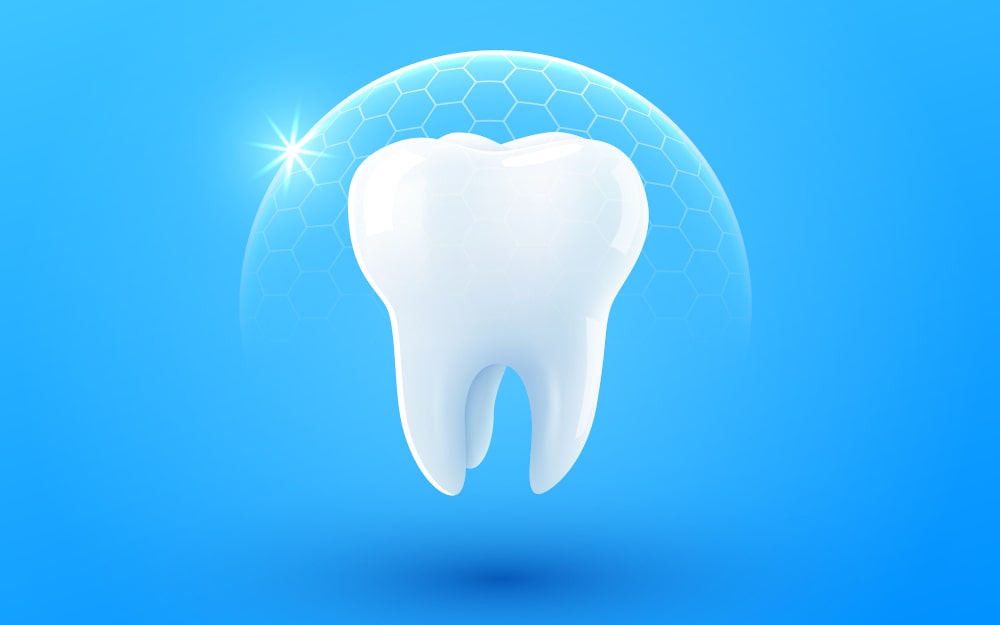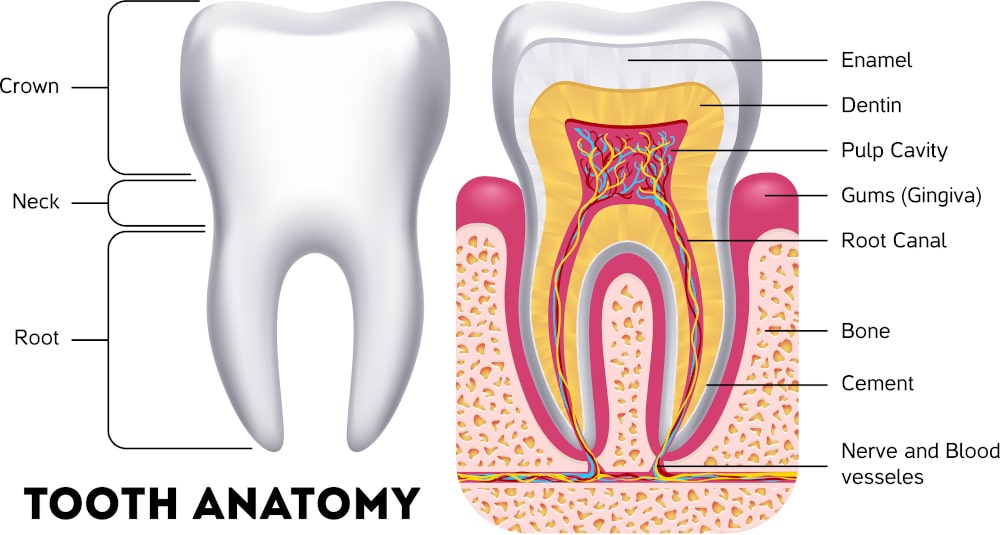
What is tooth enamel, and why is it essential for oral health?
Key Takeaways
- Tooth enamel is the hardest substance in the body, composed mainly of hydroxyapatite, but it cannot regenerate once damaged due to its acellular structure.
- Enamel protects the sensitive inner parts of teeth from physical damage, temperature extremes, and chemical exposure. When enamel erodes, it leads to sensitivity, decay, and an increased risk of infection.
- Daily care is crucial for maintaining enamel health. Using fluoride toothpaste, staying hydrated, limiting sugary and acidic foods, avoiding frequent snacking, and using a soft-bristled toothbrush all support enamel strength.
- Professional dental treatments, such as fluoride varnishes, sealants, and remineralization therapies, can help repair and reinforce weakened enamel, particularly in cases of sensitivity or high cavity risk.
- Diet plays a vital role in enamel maintenance: nutrients such as calcium, phosphorus, and vitamin D are essential, while acidic and sugary foods should be limited to prevent enamel erosion.
- Small lifestyle changes, such as rinsing after consuming acidic meals and waiting before brushing, can significantly reduce enamel damage and promote oral health longevity.
- Imagine a knight’s armour — tough, protective, and built to take a hit. Now, picture that armour on your teeth. That’s tooth enamel: the hardest and most mineralized substance in the human body. Yet, despite its strength, enamel is surprisingly vulnerable without proper care.
What is Tooth Enamel?
Tooth enamel is the thin outer layer covering each tooth, composed primarily of hydroxyapatite, a crystalline calcium phosphate. Unlike other body tissues, enamel contains no living cells, meaning it cannot regenerate once it is destroyed.
Key Functions of Enamel
- Shielding dentin and pulp from physical and chemical damage
- Providing insulation from hot or cold foods and drinks
- Supporting structure for biting and chewing without pain
When enamel is intact, you rarely think about it. But when it erodes, the consequences become hard to ignore: sensitivity, cavities, and even infection.
Composition and Structure
Enamel is composed of approximately 96% inorganic material, primarily hydroxyapatite, with only 3% water and 1% organic matter. This makes it:
- Hard but brittle — prone to chipping without the cushioning of healthy dentin
- Non-regenerative — unlike bone, it doesn't heal once damaged.
H3: Why It Matters for Your Oral Health
Damage to enamel doesn’t just mean cosmetic issues. It leads to:
- Tooth sensitivity
- Increased risk of decay
- Higher chances of tooth loss or infection
And because enamel has no nerves, you won’t feel it eroding — until the damage is done.
Expert Insight
"Preserving enamel isn’t about perfection—it’s about protection. Daily care, dietary awareness, and regular dental visits go a long way in preventing irreversible damage."
— Dr. Amir Guorgui, dentist at Barrie Smile Centre

How can I strengthen enamel through daily habits?
Most of us don’t think about tooth enamel until something goes wrong. But strengthening enamel doesn’t require complicated routines — it’s often about small, consistent habits that make a big difference.
Daily Habits That Support Enamel Health
1. Use a Fluoride Toothpaste
Fluoride is the MVP of enamel care. According to the Canadian Dental Association (CDA), fluoride helps remineralize weak spots and prevents early decay.
- Choose a toothpaste with 1,000–1,500 ppm fluoride.
- Brush twice daily, ideally after meals.
2. Stay Hydrated
Saliva isn’t just spit — it’s a natural buffer that neutralizes acids and provides minerals to teeth.
- Drink plenty of water throughout the day.
- Avoid dry mouth by limiting caffeine and alcohol.
3. Avoid Frequent Snacking
Each snack exposes teeth to a new acid attack.
- Stick to three main meals and limit between-meal snacks.
- If you snack, rinse with water or chew sugar-free gum afterward to help prevent tooth decay.
4. Limit Sugary and Acidic Foods
These create an acidic environment that weakens enamel over time.
- Reduce consumption of soda, citrus fruits, and candy.
- Replace with alkaline options, such as cheese, nuts, or plain yogurt.
5. Use a Soft-Bristled Toothbrush
Hard brushing can physically wear enamel away.
- Brush gently in small circles, avoiding harsh back-and-forth motions.
- Replace your toothbrush every 3 months or sooner if the bristles become frayed.
Enamel-Friendly Daily Checklist
| Habit | Frequency | Notes |
|---|---|---|
| Fluoride toothpaste | Twice daily | Avoid rinsing your mouth immediately after brushing |
| Hydration | Ongoing | Carry a refillable bottle |
| Avoid sugary snacks | As needed | Stick to structured meals |
| Mouth rinse (fluoride) | Nightly | Optional but beneficial |
| Soft-bristled brush | Ongoing | Replace quarterly |
Are there professional dental treatments to strengthen tooth enamel?
Even with excellent home care, some enamel damage requires professional help. The good news? Modern dentistry offers several non-invasive options to help protect and reinforce enamel.
H3: 1. Fluoride Treatments
These are higher-concentration versions of what you find in toothpaste.
- Often applied as gels, foams, or varnishes.
- Strengthen weakened enamel and prevent decay.
- Recommended for patients with sensitivity, dry mouth, or high cavity risk
2. Dental Sealants
Primarily used on molars, especially in children, but is also increasingly applied in adults.
- Act as a protective barrier against food and bacteria
- Especially effective on deep grooves and pits
3. Remineralization Gels or Pastes
These may include calcium phosphates, fluoride, and xylitol.
- Applied with trays or directly on teeth
- Support the natural rebuilding process where enamel has begun to erode.
4. Desensitizing Treatments
Used when erosion leads to sensitivity.
- Temporarily seal open dentinal tubules.
- Allow enamel to remineralize in a less reactive environment.
How does diet affect enamel health and strength?
You are what you eat — and so is your enamel. Diet plays a massive role in maintaining enamel integrity. Some foods nourish and protect, while others weaken and corrode the body.
H3: Nutrients That Support Enamel Health
- Calcium – Strengthens enamel and dentin. Found in dairy, leafy greens, and almonds.
- Phosphorus – Works with calcium to rebuild enamel. Found in meat, fish, and eggs.
- Vitamin D – Helps your body absorb calcium effectively. Get it from sunlight, eggs, and fortified milk.
Enamel-Protective Foods
| Nutrient | Food Sources | Enamel Benefit |
|---|---|---|
| Calcium | Cheese, yogurt, kale | Re-mineralizes enamel |
| Phosphorus | Fish, lean meats, and tofu | Strengthens the tooth surface |
| Vitamin D | Eggs, fatty fish, fortified cereals | Enhances calcium absorption |
Avoid These Common Enamel Offenders
- Carbonated soft drinks – High in acid and sugar
- Citrus fruits and juices – Natural acids that soften enamel
- Vinegar-heavy dressings or pickles – Surprisingly erosive
- Candies and sweets – Feed acid-producing bacteria
Eat to Neutralize
- End meals with cheese or milk to restore pH balance
- Rinse with plain water after acidic foods.
- Wait 30 minutes before brushing if you’ve consumed acid-heavy items.
What are the best products to help strengthen tooth enamel?
The dental care aisle can be overwhelming. From pastes to mouthwashes, how do you know what helps enamel? Here’s a clear look at the best enamel-strengthening products available today.
Top Product Categories
1. Fluoride Toothpastes
These help to rebuild early enamel damage and prevent decay. Look for:
- Sodium fluoride or stannous fluoride
- ADA or CDA approval
2. Fluoride Mouthwashes
A good complement to toothpaste, these can reduce demineralization.
- Use daily before bed.
- Avoid rinsing with water afterwards.
3. Prescription-Strength Options
For patients with moderate enamel erosion, dentists may recommend:
- High-fluoride toothpaste (5,000 ppm)
- Custom-fit trays with remineralizing gel
Product Comparison Table
| Product Type | OTC Example | Prescription Option | Strengthens Enamel? | Notes |
|---|---|---|---|---|
| Toothpaste | Sensodyne Pronamel | Clinpro 5000 | ✅ Yes | ADA- and CDA-approved options exist |
| Mouthwash | ACT Restoring | PreviDent Rinse | ✅ Yes | Use before bedtime, don't rinse |
| Remineralizing Gels | GC Tooth Mousse | MI Paste Plus | ✅ Yes | Often used in trays |
| Sealants (in-office) | — | Applied by a dentist | ✅ Yes | Long-term preventive protection |
Professional Note
"Products can help, but the key is choosing the right one for your situation. We always assess enamel wear before recommending any prescription-strength options."
— Dr. James C.H. Ko

Is there a difference between strengthening teeth and strengthening enamel?
Yes — and understanding the distinction matters. Enamel is part of the tooth, but not the whole story.
Tooth vs. Enamel: What’s the Difference?
- Enamel: The outer, protective shell. Hard but non-living.
- Dentin: Beneath enamel. Softer, it contains tiny tubules.
- Pulp: The living centre with nerves and blood vessels.
Strengthening Enamel vs. Strengthening the Whole Tooth
| Objective | Methods Involved | Target Area |
|---|---|---|
| Enamel Strengthening | Fluoride, calcium phosphate, and remineralizing agents | Outer surface |
| Tooth Strengthening | Overall nutrition, hygiene, and structural integrity | Enamel + dentin |
Why It Matters
If the enamel is worn down but the dentin is healthy, fluoride treatments may be sufficient. But if the whole tooth is compromised — due to decay or trauma — you’ll need more comprehensive care like bonding or crowns.
What signs indicate that your enamel is weakening?
Tooth enamel wears down gradually, but leaves behind subtle clues. Catching them early can prevent larger issues.
Early Warning Signs of Enamel Erosion
- Increased sensitivity to cold, heat, or sweets
- Discolouration, especially yellowing
- Rounded or thinned edges of teeth
- Cracks or chips without trauma
- Transparency near the biting edge
Symptom Checklist
| Symptom | Possible Cause | Action You Should Take |
|---|---|---|
| Sharp pain with cold drinks | Enamel erosion | Use sensitive toothpaste, and see a dentist |
| Yellowed teeth | Thinning enamel | Limit acids, consider a fluoride rinse |
| Rough biting edges | Enamel wear | Get a dental exam, avoid grinding |
When Should You See a Dentist About Enamel Issues?
A slight tooth sensitivity after consuming an ice-cold drink may not be a significant concern. But enamel damage can escalate quietly — and sometimes quickly. So, when is it time to stop relying on DIY care and call your dentist?
Warning Signs That Require a Dental Exam
If you notice any of the following symptoms, professional evaluation is recommended:
- Persistent sensitivity to hot, cold, or sweet foods
- Visible changes in the shape, colour, or thickness of teeth
- Increased roughness or sharpness at the tooth edges
- Unexplained chipping or cracking
- White spots or dull areas that don’t go away
Why Early Diagnosis Matters
Unlike a sprained ankle or a paper cut, enamel doesn’t heal on its own. The earlier a dentist can assess your enamel, the more likely they can:
- Stop erosion in its tracks
- Reverse mild demineralization
- Avoid restorative procedures, such as fillings or crowns.
How a Dentist Can Help
At Barrie Smile Centre, we use digital diagnostics and enamel-safe treatments to:
- Measure enamel wear
- Identify contributing factors (acidic diet, bruxism, etc.)
- Recommend fluoride applications, sealants, or dietary changes.
Book a Consultation
Not sure if what you’re feeling is serious? It’s better to check early than to wait. Click here to book a visit with our team.
What is the best way to protect your enamel in the long term?
Enamel doesn’t grow back — but with the right strategy, it can stay strong for decades. The key? Consistency. Awareness. And a dentist who knows your smile.
Recap: Daily and Professional Strategies
| Strategy Type | Action Item | Frequency/When |
|---|---|---|
| Daily Care | Use fluoride toothpaste | Twice daily |
| Diet Habits | Limit acidic/sugary foods | Every meal |
| Professional Care | Fluoride treatment, sealants if needed | Every 6–12 months |
| Self-Check | Look for signs like sensitivity/discoloration | Monthly self-assessment |
| Hydration & Saliva | Drink water, chew sugar-free gum | Throughout the day |
Final Thoughts
Protecting enamel doesn’t take drastic changes — it takes intentional habits, regular check-ups, and the right tools.
Still unsure if your enamel is in top shape? Let’s take a look together.
👉 Book your free consultation at Barrie Smile Centre today
References
- American Dental Association – www.ada.org
- Canadian Dental Association – www.cda-adc.ca
- Colgate Oral Health Library – Colgate.com
- GC Tooth Mousse – gcamerica.com
Frequently Asked Questions (FAQ)
How does saliva contribute to enamel protection?
Saliva plays a crucial role by neutralizing acids in the mouth, supplying minerals like calcium and phosphate for natural enamel remineralization, and flushing away food particles and bacteria.
Can enamel erosion cause tooth discoloration?
Yes, as enamel thins due to erosion, the underlying dentin (which is yellowish) becomes more visible, causing teeth to appear darker or discoloured.
How do certain medications affect enamel health?
Some medications, such as antihistamines and antidepressants, can reduce saliva production, increasing the risk of enamel erosion and tooth decay due to a drier mouth environment.
Is enamel erosion reversible?
While enamel cannot regenerate, early-stage erosion can be halted or partially reversed through remineralization treatments, improved oral hygiene, and dietary changes.
How do acidic drinks affect enamel differently than sugary foods?
Acidic drinks directly lower the pH in the mouth, dissolving enamel minerals, while sugary foods feed acid-producing bacteria that create acid as a byproduct, both leading to enamel breakdown.
Can teeth whitening damage enamel?
When used correctly, professional teeth whitening is safe, but overuse or misuse of whitening products can weaken enamel and increase sensitivity.
How often should I visit the dentist to monitor enamel health?
Regular dental check-ups every 6 months allow for early detection of enamel wear, timely treatments, and personalized advice on protecting your teeth.

See what our patients are saying:
The Barrie Smile Centre is the best dental office I've ever been to. The staff is very friendly,professional and knowledgeable. They take away any anxiety and fear of going for a procedure. I highly recommend them!
Very clean, professional and friendly! They have done lots of work for me including 2 implants. I highly recommend them!
Very clean, professional and helpful. 2 other dentists previously tried to fix my composite veneer and both times it look awful and/or was the wrong colour. One trip here and everything was fixed!
Very friendly, helpful staff. Makes you feel welcome as soon as you enter. I needed a tooth removed and got in the same day I called. When I arrived I didn’t have to wait. I have numerous problem with my teeth and they came up with a solution. Thank you all so much.
Just got home from the Smile Centre and I'm thrilled with my results. Had Zoom whitening, and it was better than I expected. The attendant took the time to explain everything super thoroughly. She warned I may have sensitivity but so far so good. I wish I did it ages ago.
The first thing I noticed upon entering the building was the beautiful design plan and lovely staff. I was greeted at the door and made comfortable throughout my entire experience. Everything was explained to me in detail and the staff always made sure I fully understood. This is an amazing office and I would 10/10 recommend it!!
Amazing fast clean attentive friendly ! Im sold! Thankkk youuuuu guys !!!!!!! Had a wisdom.tooth taken out under sedation! All.went perfect and you guys were awesomee!
Every time I go to the Smile Centre in Barrie it’s an amazing experience! Everyone from the admin staff to the dentists are so helpful. Not only do they tell you your options (in my case options for a missing tooth), but they also explain the pros and cons of every option. I highly recommend the Smile Centre
Barrie Smile Centre is truly amazing I called and had an issue with with some tooth pain they were able to fit me in same day which I was truly grateful for. All the staff are kind and professional they truly care about there patients. Big thank you to Dr.Eisen for being so kind and helping me in this situation. I highly recommend Barrie Smile Centre 😃 Thanks again
Great family dentist, has always been on time for appointments. Doing a great job during these times with cleanliness as well! Very professional staff!

